Life for the Tsar
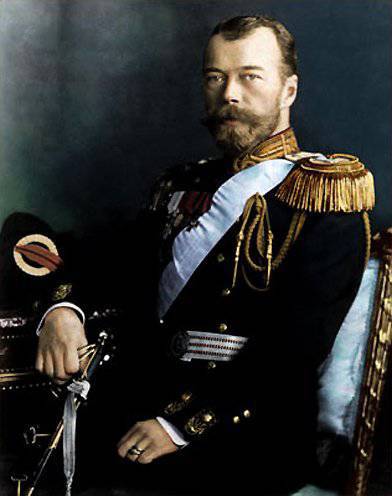
Even a superficial glance at the quality of protection of the top officials of the Russian state in the newest stories and the level of security of some representatives of the Romanov dynasty will allow us to conclude that the comparison is clearly not in favor of the latter. Agree, it is difficult to imagine the president of our country in proud solitude walking along the shady alleys of the Alexander Garden. But Alexander I could afford not only to walk without a retinue, but also without guards, for example, along Palace Embankment, to speak with random passersby. However, not all Russian tsars were so serene. Nicholas II confirmation of this ...
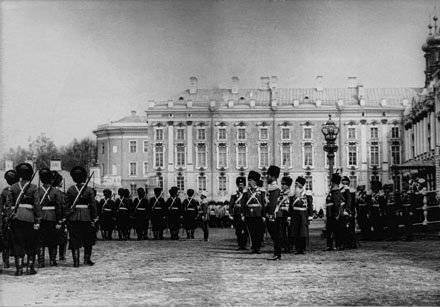
Starting from the XVIII century and up to 70 of the XIX century, in modern terms, the degree of external terrorist threat for Russian monarchs was extremely insignificant: the preventive measures protecting them from attacks by foreign or home-grown killer-mercenaries were not relevant. Far more likely was a perfidious stab in the back, which could be inflicted by ... guards, paradoxically, that is, a priori, faithful and reliable guardsmen. It was they who brought Sophia Alekseevna, Peter the Great, Catherine I, Elizabeth Petrovna, Catherine II and Alexander I to power without having spared the three emperors - Peter III, Ivan VI and Paul I.
And Western politicians were right in believing that the Russian autocracy was limited to a noose - this was just the noose used by the guards, who by their very existence restrain the highest folly of monarchs. That is why the emperor Alexander I, a careless lover of walks through the central streets of the northern capital, who was often seen in evenings in Tsarskoye Selo, hurrying to meet in a long raincoat and hat pulled over his eyes, vigilantly watched the guards officers and dignitaries approaching him. And not only watched, but also severely punished only on suspicion of conspiracy, without having real evidence, sending his sister Ekaterina Pavlovna to the honorable exile in Tver, and sending off her favorite Prince Bagration to Moldova.
After the memorable December 1825 events of the year, Nicholas I and his successors, without any liberalism, dislodged the spirit of free-thinking from the guard, surrounding themselves with, perhaps, not so much "brilliant" officers, as non-condemning warriors. It is enough to recall at least Count Alexei Vronsky, the hero of Tolstoy's “Anna Karenina”: horse racing, adultery, maps and wine - a clearly defined circle of interests, in which there is no room for politics. They will order a machine gun to be studied. Maxim will study it thoroughly, and he won’t even take an interest.
It would seem that the status quo was restored. At least for a few decades. For example, the same Nicholas I, in 1838, removed the nighttime posts of the armed guard from the private chambers of the Winter Palace as unnecessary. And during the coronation celebrations in Moscow in 1856, the guard of Alexander II was much more concerned about the appearance of the royal convoy, rather than the security of the emperor. Not to mention that on the eve they were given guns and pistols of the new system, which they didn’t know how to own.
After the coronation, Alexander II, as once his reigning relative and namesake, continued the promenade along the streets of St. Petersburg with the only difference that numerous police posts were set up on the intended route of his walk. It is amazing that they didn’t make adjustments to this order even after Dmitry Karakozov tried to shoot the monarch in 1866 year: the terrorist was hanged, the king got off with a slight fright, but did not abandon the brooding wanderings around the Summer Garden. Interestingly, at the time of the assassination, all police officers simply stood at attention, loyally eating the eyes of the emperor: it was because of Karakozov that he came so close. It took another terrorist attack so that common sense would prevail and the king would finally stop walking around the city. This happened due to another attempt that Alexander Solovyov made in 1879.
It is surprising that around the king on that April day there were at least twenty police officers and plain-clothes agents in the 100-meter zone, which did not prevent the villain from approaching the autocrat ten meters away, getting a revolver and opening fire. A crowned person shouting "Save me!" Ran away from a terrorist in zigzags. However, while the police tied up Solovyov, he managed to fire five bullets, two of which shot through Alexander II’s overcoat.
In the next two years, the militant organization of the “Narodnaya Volya” party made eight attempts on the tsar-liberator who abolished serfdom, which ended with his murder on the Catherine’s canal. And the guard failed to protect the emperor. It is logical to assume that the successor of the deceased monarch made the right conclusions from the tragedy that had happened, surrounding himself with a reliable guard and comprehensively prepared for the excesses. Far from it. Alexander III, and subsequently Nikolay II, simply refused to live in the capital of their own state, moving to country residences and only occasionally visiting St. Petersburg at official ceremonies.
Fortress of the last emperor
Perhaps, the person who finds himself on an uninhabited island feels most secure from external threats. Approximately such an island, or rather, the fortress became for the bitter experience of Nicholas II and his family Alexander Palace - a secluded building in the depths of Tsarskoye Selo park. The summer northern residence of the tsar was a summer cottage on the shores of the Gulf in Alexandria Park, three versts from famous Peterhof fountains. Like his father, Nicholas II spent a lot of time on the hunt in Belovezhskaya Pushcha and lived in Livadia for a long time. It is the isolation from the world, isolation and formed the basis of its security system.

Almost six months before the coronation of Nicholas II, the head of the Tsar's guard, P. A. Cherevin, went to Moscow to resolve organizational issues. Then he was joined by almost all the ranks of the palace police and the gendarme officers and police officers with lower ranks assigned to her. They have not once thoroughly checked all the buildings in which ceremonial events were planned, as well as plumbing and sewage systems. On the eve, two military units arrived in Moscow, providing security for the imperial family, and four more trains — the emperor's own convoy, which is almost 600 people.
The area around the royal residences was considered a forbidden zone, to cross the borders of which from the outside was unsafe. In any case, without special permission from the police. Moreover, the refusals were not motivated by anything and were not discussed, regardless of the identity of the potential visitor. In the parks of Livadia, Tsarskoye Selo and Peterhof, special trenches for security were dug out and carefully masked from prying eyes, as Nicholas II knew perfectly well, throwing gold coins into these shelters.
The special guards, reporting directly to the palace commandant, monitored all residents of the settlements of the palace department. To assist them, supernatural police officers were assigned to carry out inspection and registration of the population.
By the beginning of the royal hunt, solid military groups were concentrated in Spala, which simultaneously guarded the tsar and drove the beast. For example, one of such comfort was covered by the Life Guards Ulansky regiment, the Grodno Hussars, the Kuban Cossack hundred, and the battalion of the Third Guards Infantry Division.
Since the emperor’s summer dacha was right on the water’s edge, guard boats patrolled it from the sea, and on the whole coast of the Gulf of Finland from Mikhaylovka to Peterhof in 50 – 100 meters from each other, two-storey guard houses with brick walls one and a half meters apart were built at a distance of direct visibility , thicker, more resembling forts. By the way, during the years of the Great Patriotic War, they withstood shots of ship and coastal 152-mm guns!
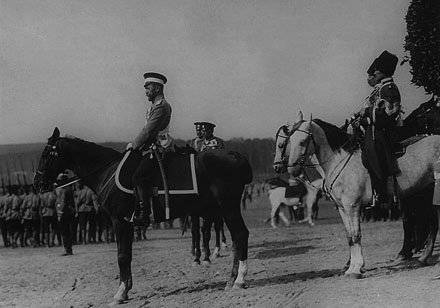
The royal road-paths
Of particular concern to the palace guard were the movements of the emperor between the residences and his traditional trips around the country. To ensure their safety, the 1 railway regiment was specially formed and built two twin trains — the Tsar and the Sweets (and later four more), equipping them with autonomous power stations, steam heating and the first and only air conditioners in Russia called “wind coolers”.
There was a guard in the head and last cars, which at the stops immediately cordoned off the cars with members of the imperial family. The royal and suite trains were constantly changing places along the route. And it wasn’t an empty task: in November 1879, the terrorists blew up the train of the train, mistaking it for the royal train.
Railway stations were built so that the monarch in the shortest possible time was able to transfer to another type of transport. So, in Sevastopol, the railway station is just a few meters from the pier of the South Bay, and the emperor was within reach of the train to the yacht.
During periods of short trips to cities in Russia, Nicholas II and his family usually spent the night in a train or on the yacht "Mezhen". On special occasions, as it was at the celebrations in honor of the 200 anniversary of the Battle of Poltava and the 100 anniversary of the Battle of Borodino, special railway lines were laid for the royal staff. Moreover, some historians and St. Petersburg ethnographers claim that they even built a subway for Nikolai II, or more precisely, its analogue: it was possible to take an electric carriage by underground from the Alexander Palace.
At first, Nicholas II was rather hostile to "self-propelled carriages." “While I live in Livadia, cars should not appear in the Crimea,” he said once, which put a taboo on the use of vehicles on the peninsula until 1903, until during the visit to relatives in Hesse, the brother of Emperor Ernst the Great Duke of Hesse after a fair binge did not ride Nicholas II on the "engine". As a result, by the spring of 1914, about 50 cars were “registered” in the royal garage - more than any other monarch of the world. For their transportation, they built two special garage cars.
During the king’s travels by train along the entire railway track, every few dozen meters there were sentries who, without warning, opened fire on all the people who were close to the canvases, which is why a rare trip like this did without shooting innocent people. . Approximately the same was organized and the movement of the emperor on the highways. Thus, in 1911, when Nicholas II was traveling from Kiev to Ovruch, soldiers and horse guards were staggered at an interval of five meters along the route in staggered order, and the guards carefully inspected all the houses along the route, checking their inhabitants. Should I talk about how the passage of the royal motorcade was arranged around the city ?! However, in this scenario for a hundred years in Russia, little has changed ...
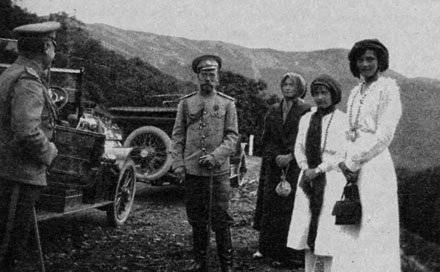
Documents were kept on the journey of Nicholas II with his wife and daughters in July 1903 to worship the relics of Seraphim Sarovsky in the Sarov Desert of the Tambov province. A few months before departure, they made accurate maps of the path of the Tsar's motorcade and allocated to the zemstvo 15 thousands of rubles to “correct” roads and bridges. Before each settlement on the route, whether it is a village or a village, they built arches not less than six meters wide.
Tens of thousands of people — soldiers, policemen, and volunteer guards — left the king on guard, not sparing funds for their uniforms, equipment, food supplies, and salaries. In fact, two guards were placed in each house on the way of the imperial family, all the drinking establishments and state-owned wineries were closed, and even they were forbidden to heat the stoves in order to avoid a fire. These dressed up "guests" were supposed to depict jubilant peasants. And in the hands of all who stood on the side of the road there should have been nothing but caps.
And in the Sarov Desert, the “pilgrims” were already looking forward to the arrival of the tsar: the 11 Grenadier Infantry Regiment of Fanagori, three hundred 1 of the Don Cossack Regiment, numerous seconded police officers and agents from St. Petersburg, Moscow and Tambov, as well as more than one and a half thousand provincial deputies and representatives of decorative societies. But among the indigenous inhabitants of the desert they cleaned, temporarily sending some of them to remote farms.
"And the Cossack is misguided!"
In May, 1895, the gendarmes reported to the king about the great success in the fight against terrorists who planned to kill Nicholas II during coronation celebrations: “The searches conducted by the attackers were discovered: a laboratory with all sorts of accessories for making shells, a literature on the people and other data that completely outlined the circle in conceived atrocity. "
At the head of the organization was Rasputin, though not Gregory, but Ivan, whose like-minded 35 had been arrested. Seven conspirators, including their leader, were sentenced to death by hanging, and Zinaida Gerngross was sentenced to 20 years in prison. However, the sentence unexpectedly underwent significant changes: the penalty was replaced with hard labor, and Gerngross was sent to Kutais. Could the king, in joy, have pardoned the villains?
But no! The fact is that the real organizer of the assassination was not Rasputin, but Zinaida Gerngross, 20, who came from a wealthy family. Immediately after graduating from the Smolny Institute of noble maidens, a tall, slim girl with a shock of golden hair made an appointment with Colonel Semenov, vice-director of the police department, and asked to be identified as secret agents. Identified. And it’s not in vain: it was she who inclined Rasputin’s student circle, which was engaged in idle talk, to the terrorist act against the sovereign, who, in turn, fearing her exposure, softened the sentence to the unlucky militants. Already in Kutais, Gerngross agreed with the medical student Zhuchenko for conspiratorial purposes, married him, finding a new surname, and even gave birth to a son.
It is pertinent to note that Nicholas II very closely followed the activities of his agents in revolutionary organizations, and he knew many of them by name. He knew and highly appreciated: for example, Yevno Azef and Zinaida Zhuchenko received fees that exceeded the salary of the Minister of the Interior. For four decades, up to 1917, various opposition political parties, circles and societies have worked tirelessly, according to various estimates, from 10 to 30 thousands of sexists! Not without their participation, many hundreds of revolutionaries were executed and tens of thousands arrested.
The provincial gendarme authorities used secret funds to buy printing presses, and agents arranged underground printing presses. Of course, it all ended with a brilliant operation to capture the rebels and the generous rain of the ranks and orders with which the king showered his loyal subjects.
However, the massive use of provocateurs had negative consequences: gradually, they and their police commanders started up “their games”. Thus, by order of the agent Azeph, the grand duke Sergei Alexandrovich, the uncle of the tsar, the interior ministers of Stolypin and Plehve, and a number of other dignitaries were killed. It is curious that Azef organized the attempt on the Moscow mayor Admiral Dubasov, and Zinaida Zhuchenko reported on the impending attack.
In 1907, police agent A.Ye. Kazantsev initiated two attempts on the former Prime Minister S. Yu. Vitte, fortunately unsuccessful, but pursuing rather loud political goals, including the dissolution of the Second State Duma. Two years later, Colonel von Koten, with the help of a triple (!) Agent Tarasova, substituted the chief prison inspector Yuferov, whom he disliked, by arranging a group escape from a women's prison. However, some such actions had a much more dramatic outcome.
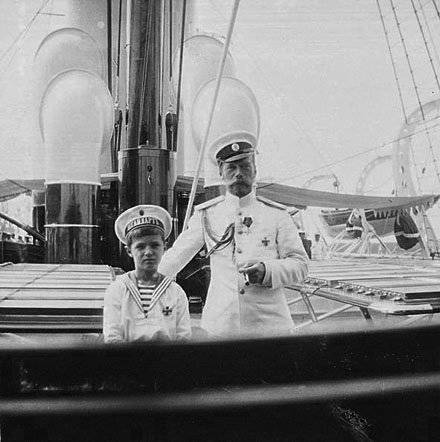
... At the end of August 1911, Nicholas II and his family and ministers arrived in Kiev at the opening of the monument to Alexander II. The program of the emperor's visit included a visit to the opera “The Tale of Tsar Saltan”. Of course, the police thoroughly inspected the theater, in some places even having opened the floors, and in the tsar's bed, reinsuring themselves, put out a twenty-four-hour guard post a week before the performance! Those who were supposed to behave, and those who had the honor of being on the list of invitees drawn up in the Kiev city administration, were subjected to scrutiny. Needless to say, the auditorium, all outbuildings and the area around the theater were literally teeming with police officers and secret security agents, however, despite extraordinary precautions, the terrorist attack could not be avoided, and Prime Minister Stolypin was mortally wounded.
Here is how Nicholas II described what happened in a letter to his mother, Empress Maria Feodorovna: “... In the evening a dirty assassination attempt on Stolypin occurred in the theater. Olga and Tatiana were with me then, and we just got out of the box during the second intermission, as it was very hot in the theater. At this time we heard two sounds, like the sound of a falling object; I thought that from above someone had hit the binoculars on his head, and ran into the box.
To the right of the lodge, I saw a bunch of officers and people who dragged someone, several ladies shouted, and Stolypin stood directly against me in the pit. He slowly turned his face to me and blessed the air with his left hand ... While Stolypin was helped out of the theater, there was a noise in the corridor next to our room, there they wanted to do away with the murderer; in my opinion, unfortunately, the police beat him off from the public and took him to a separate room for the first interrogation. ”
Note that the emperor regrets that the terrorist was not finished off on the spot, although the head of a civilized state should not welcome samosud. But do not blame Nicholas II for the lack of logic, because he had sufficiently strong arguments in favor of the killer did not live to see the interrogation. And the main one - the killer of Stolypin Bogrov (the agent's pseudonym - Kapustiansky) has served for five years in the Kiev security department. And he not only was engaged in squealing in Russia, but also carried out rather delicate and not related to the revolutionary movement orders abroad. It is not surprising that a gendarme lieutenant colonel Kulyabko personally handed the ticket to the theater to Bogrov.
The reprisal of the agent who knew too much was fast: eleven days were more than enough for the investigation and the closed trial, after which Bogrov was hanged. And on September 9, 9, on the day of Stolypin's funeral, the king danced at the ball at the Maritime Assembly in Sevastopol ...
Retinue "under the hood"
The nonstop eye of the secret police and the relatives of Nicholas II, including the Empress Maria Feodorovna and Brother Mikhail, did not bypass the members of the government. One of the most effective forms of spy surveillance was the perusal of letters, from which, contrary to the Bolshevik theory of class struggle, the working people suffered least of all. Partially, and even if there were reasons, the correspondence of the middle class was selectively controlled, but without fail all correspondence of the members of the imperial family, ministers, department directors, governors-general and other representatives of the highest aristocracy was read. The only exceptions to this unwritten rule were the letters of Nicholas II himself and the Minister of the Interior. It is significant that even the chief of gendarmes ND Selivestrov, sending a very important letter to the London courier, asked the addressee to send him a reply with the diplomat of the Ministry of Foreign Affairs, since his correspondence is being perused.
After the assassination of the Minister of the Interior, D. S. Sipyagin, V. K. Plehve, appointed in his place, found in the desk of his predecessor a copy of not only his letters, but also his wife’s letters. A similar discovery was made by the director of the police department, A. A. Lopukhin, who stumbled upon the attempt on Plehve in the office of the deceased upon a packet of his own letters.
Year by year, the volume of perusal growth has steadily increased. If in 1882, 3600 extracts from opened letters were made, in 1905, this indicator almost tripled, and in 1907, the number of extracts exceeded 14200. All of them went to the police department, where they were acquainted with the officials of the special department. After that, the most remarkable and deserving of the highest attention was reprinted on a typewriter (sometimes photocopies were taken, as was the case with letters from the brother of the tsar, Grand Duke Mikhail Alexandrovich, to the daughter of the leader of the nobility of one of the southern provinces) and the package was delivered to Nikolay II via a special communication channel - in fact from hand to hand.
Perusal was one of the emperor's favorite activities. If the pauses between deliveries of statements were delayed, he would get angry and demanded an explanation of the reasons. And, as the censor S. Maisky writes, he put aside any business when he finally received a familiar package.
By 1890, all telegraph devices in the royal apartments, with the exception of the office of Nicholas II himself, that had been in service for more than a decade, were replaced by telephones. The emperor's office was in the next room, closed in a special closet. And it is not difficult to understand why: the interception of telephone conversations of members of the royal family and courtiers began almost immediately after the installation of telephone sets. For example, in the Alexander Palace and the surrounding buildings, there were about a hundred subscribers. The listening rooms were located in the basement of the palace, where two gendarme officers were on duty around the clock. However, the courtiers chatted so much on the phone that the staff of the "hearers" had to be increased.
In addition, telephone booths were installed in the parks of the imperial residences, from which the guards reported on the movements of the royal family members and guests. Alexandra Feodorovna became annoyed, and she ordered the removal of eleven booths from the park of the Livadia Palace. No sooner said than done. Soon, however, Grand Duchess Anastasia noticed that the guards were using telephones hidden in the hollows of trees and in special niches hollowed out in the walls of buildings. After the end of the conversation, the niche was tightly closed with wooden doors, painted to the color of the wall, and so neatly that the mosquito of the nose would not fade.
Information